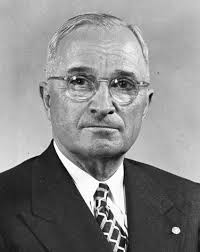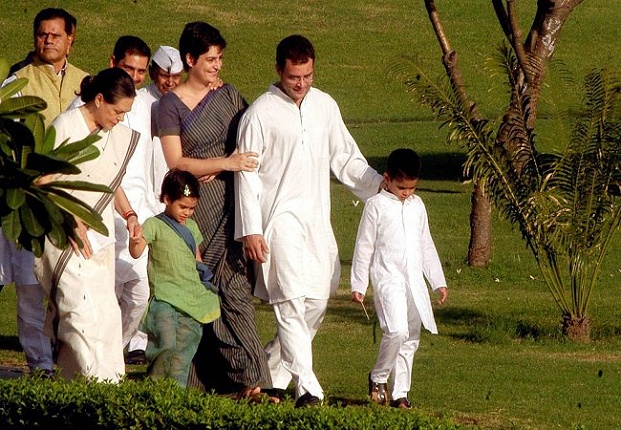The Congress party that was founded by an Englishman may be ended by an Italian woman. It has always looked to foreigners and foreign sources for inspiration. Recent election results show that this ploy of projecting foreign faced exhibits in the name of ‘charisma’ may no longer be working.
By any rational measure, the performance of the Congress party in recent elections was dismal. This was not denied even by its matriarch Sonia Gandhi. What she did deny was the blame for the debacle: the party organization, wrong candidates— in short everything and everyone except herself and her family. (Who selected the candidates and set up the party organization?) It was a surreal experience to see family members from Sonia Gandhi, Priyanka, later joined by her husband Robert Vadra coming to the aid of the beleaguered Rahul, before and after the election. This means for all practical (and theoretical) purposes, the Congress begins and ends with Sonia and her family (including her mother and sisters though the media does not want to mention it).
 This raises a fundamental question: what makes a great political party that claims to have fought hard and long to end European colonial rule present a European-born woman with no record of achievement or service to the nation as the one best fitted to lead the country? The answer is to be found in the fact that the history of modern India as found in textbooks is the version written by the successful side— the Congress party that has held power for the better part of 60 years. As President Harry Truman once said, history is always written by the winners.
This raises a fundamental question: what makes a great political party that claims to have fought hard and long to end European colonial rule present a European-born woman with no record of achievement or service to the nation as the one best fitted to lead the country? The answer is to be found in the fact that the history of modern India as found in textbooks is the version written by the successful side— the Congress party that has held power for the better part of 60 years. As President Harry Truman once said, history is always written by the winners.
This monopoly gave it ample opportunity to impose a version of history that showed the Congress and its leaders in the most favorable light. A historical myth was created meant to show its leaders as national heroes in a titanic struggle against a formidable foreign adversary. The reality is quite different. Examination of the history of the last 80 years and more shows that at crucial points the Congress leadership has looked beyond the borders for inspiration and even guidance. This was true of Mahatma Gandhi as well as Jawaharlal Nehru and now Sonia Gandhi, her children and their followers.
Looking Beyond the Borders
Most people today recognize there is little that can be called Indian in the rootless Nehru-Gandhi family. But it will probably come as a surprise to many to be told that Mahatma Gandhi also drew his inspiration mainly from Western sources. Hind Swaraj, Gandhi’s most important work does not contain a single reference to any Indian work; the sources are all Western— Thoreau, Tolstoy and the like. As far back as 1926 Sri Aurobindo observed:
Gandhi is a European— truly, a Russian Christian in an Indian body. …When the Europeans say that he is more Christian than many Christians (some even say that he is the ‘Christ of the modern times’) they are perfectly right. All his preaching is derived from Christianity, and though the garb is Indian the essential spirit is Christian. He may not be Christ, but at any rate he comes in continuation of the same impulsion. He is largely influenced by Tolstoy, the Bible and has a strong Jain tinge in his teachings; at any rate more than by any Indian scriptures— the Upanishads or the Gita which he interprets in the light of his own ideas.
This is a remarkable insight, for Gandhi in his zeal for nonviolence turned the Gita into another Sermon on the Mount. It is a different matter that the Sermon on the Mount has been misinterpreted as a message of peace when in reality it was advice to the Jews to cooperate with the Roman occupiers and not retaliate against their occasional acts of violence. Gospels are political discourse fashioned in the centuries after Jesus died, assuming Jesus to be historical. They should be studied against the background of the First Jewish War in which Jerusalem was destroyed by the Romans.
Almost ten years before Gandhi arrived on the Indian scene Sri Aurobindo had noted (1906)-
…the Congress started from the beginning with a misconception of the most elementary facts of politics and with its eyes turned towards the British Government and away from the Indians.” Even the idea of special quotas for Muslims that the Congress promises in elections was borrowed from the British. In 1909, the British introduced the Morley-Minto Reforms giving Muslims a separate electorate to so-called ‘reformed’ legislatures.
Sri Aurobindo saw through it and called it a Frankenstein’s monster by a “statesman unable to appreciate the forces with which he is dealing. …The Government have decided to depress the Hindu element in the Indian people by raising the Mahomedan element, and ensure a perpetual preponderance in their own favor by leaning on a Mahomedan vote purchased by a system of preference.” No better description of vote bank politics has been written since Sri Aurobindo wrote it in 1909.
So Salman Khurshid and his ilk were simply regurgitating an idea propounded in 1909 by Morley and Minto. The only difference is that the Muslim voters today are too well informed and much too sophisticated to fall for such a crude ploy. They resoundingly rejected the communal Congress bait.
Gandhi and Khilafat: Wrong Perception of History
This tendency of the Congress to play the communal card and look beyond the borders came to the fore in 1920 when Mahatma Gandhi launched the great non-cooperation movement in support of a medieval agitation known as the Khilafat. It was for the restoration of the Sultan of Turkey who had lost his empire following his defeat in the First World War. (The Sultan had pretensions to being the successor to the Caliph— a claim not recognized by Muslims outside India.) The whole thing was based on a historical fallacy and the atavistic mindset of the Muslim clergy.
Here is a little background. During the First World War (1914 – 18) Ottoman Turkey had fought on the side of Germany and suffered a disastrous defeat. Kemal Ataturk, who rescued Turkey from chaos wanted to modernize the country and wanted no part of the Sultanate with roots in the Middle Ages. But the Sultan had pretensions being the successor to the Caliphs. This was a nineteenth century fiction cultivated by the Sultans that had no basis in history. The Mongol warrior Hulegu Khan (the grandson of Chingis Khan) had ended the Caliphate by having the last legitimate Caliph Al-Mustassim and his sons kicked to death following the sack of Baghdad in 1258.
But some Indian Muslim leaders, notably the Maulanas Shaukat Ali and Mohammed Ali wanted the British to restore the deposed Sultan as pseudo-Caliph! They even started an agitation for it calling it the Khilafat. Gandhi went along with them and persuaded the Congress to support the Ali Brothers in their demand. He even went on to launch the Non-Cooperation Movement in support of the Khilafat demand. In launching the Khilafat non-cooperation movement, Gandhi was prepared to abandon the goal of Swaraj—or independence—in favor of the Khilafat. In Gandhi’s own words-
To the Musalmans Swaraj means, as it must, India’s ability to deal effectively with the Khilafat question… It is impossible not to sympathize with this attitude… I would gladly ask for the postponement of the Swaraj activity if we could advance the interest of the Khilafat.’
Gandhi even promised ‘Swaraj within the year’ to the Ali brothers. Two points are worth noting. The people of Turkey themselves had no use for their Sultan cum pseudo-Caliph whom they eventually drove into exile. (Kemal Ataturk called Islam an ‘Arab superstition’.) Secondly, the Congress, only a year earlier, had declared Swaraj as independence to be its goal. But Gandhi was not only prepared to abandon the goal in favor of a discredited, nationally irrelevant theocratic institution, but even went to the extent of defining Swaraj itself as support for the Khilafat. It is also a fact of history— though not emphasized in history books today that Gandhi’s movement led to a jihad known as the Moplah rebellion in which thousands of innocent lives were lost.
This raises an interesting ‘what if’ of history. What if Gandhi and the Ali brothers had succeeded in driving out the British in 1922 as he had promised? Would India have been under a Khilafat Raj as Annie Beasant called it, headed by the Ali Brothers? Also interesting is the fact that Maulana Azad supported the Khilafat while Jinnah opposed it, warning Gandhi that it would help the fanatical elements in the Muslim community. His exact words were: “an endorsement of religious zealotry”. In fact it was over this that Jinnah parted company with Gandhi and the Congress.
Post Independence: Mountbatten to Sonia
The important point here is that Gandhi, instead of listening to Indian voices like Sri Aurobindo and even Jinnah, decided to go to a medieval defunct cause far beyond the borders of India for his inspiration in support of two reactionary Maulanas. The pattern continued after independence also.
As India was about to get independence, Gandhi and Nehru begged Mountbatten to continue as Governor General. When Pakistan invaded Kashmir, Nehru on Mountbatten’s advice took the case to the United Nations against the advice of his own generals Cariappa and Thimayya and even Sardar Patel. Mountbatten had advised Nehru to refer Hyderabad also to the U.N., but by then C. Rajagopalachari was Governor General and he supported Sardar Patel’s decision to act against the Nizam and the Razakars.
It was a similar story in the Northeast. General Cariappa had advised the Nehru Government to strengthen the defense and infrastructure in the Northeast, but Nehru dismissed his concerns. Nehru placed more trust on the advice of foreign missionaries like Verrier Elwin, resulting in a massive increase in Christian missionary activity in tribal areas, while Indian institutions were discouraged and even kept out.
Even today, Christian institutions, mostly controlled from outside the country, enjoy benefits that native Hindu institutions do not. This is similar to the British colonial practice of encouraging the import of products while discouraging local manufacturers. India is yet to recover from these decisions. Foreign institutions and NGOs feel themselves free to sabotage strategic decisions as they are doing with their agitation against nuclear plants in Tamil Nadu.
This brief excursion into history shows that the Congress party’s appeal to Sonia Gandhi to take over the leadership and run the country was no aberration but part of a consistent pattern going back more than a century. It is a manifestation of the party’s inability to evolve an ideology or any school of thought rooted in the soil. Its vision for the country is not national but colonial. Its leader, Sonia Gandhi, is its most visible symbol. The roots of this slavishness go back to its founding in 1885.
Roots of Foreign Dependence
To makes sense of the anomaly of a supposedly national party addicted to foreign inspiration and ideas, one must visit its origins. The Congress was founded in 1885 by Alan Octavian Hume (1829 – 1912) a British civil servant and theosophist sympathetic to Indians and their aspirations. In fact he was so sympathetic that he was several times warned by his superiors and eventually demoted and forced to resign in 1882.
After being forced out of the Government by Viceroy Lord Lytton, Hume observed that the people of India had a sense of hopelessness and wanted to do something, noting “a sudden violent outbreak of sporadic crime, murders of obnoxious persons, robbery of bankers and looting of bazaars, acts really of lawlessness which by a due coalescence of forces might any day develop into a National Revolt.” Concerning the British government, he stated that a studied and invariable disregard, if not actually contempt for the opinions and feelings of our subjects, is at the present day the leading characteristic of our government in every branch of the administration.
There were agrarian riots in different parts of South India and Bombay and Hume suggested that an Indian Union would be good as a safety valve and outlet to avoid further unrest. While sympathetic towards Indians and their aspirations, Hume did not hesitate to point out that much of their low position was due to their own lack of character. On the 1st of March 1883 he wrote a letter to the graduates of the University of Calcutta:
If only fifty men, good and true, can be found to join as founders, the thing can be established and the further development will be comparatively easy. …And if even the leaders of thought are all either such poor creatures, or so selfishly wedded to personal concerns that they dare not strike a blow for their country’s sake, then justly and rightly are they kept down and trampled on, for they deserve nothing better. Every nation secures precisely as good a Government as it merits. If you, the picked men, the most highly educated of the nation, cannot, scorning personal ease and selfish objects make a resolute struggle to secure greater freedom for yourselves and your country, a more impartial administration, a larger share in the management of your own affairs [you can’t blame others].
And he went on to chastise that otherwise-
all hopes of progress are at an end and India truly neither desires nor deserves any better Government than she enjoys. …Let there be no more complaining of Englishmen being preferred to you in all important offices, for if you lack that public spirit, that highest form of altruistic devotion that leads men to subordinate private ease to the public weal.… [As it is] patriotism that has made Englishmen what they are— then rightly are these preferred to you, rightly and inevitably have they become your rulers. And rulers and task-masters they must continue; let the yoke gall your shoulders never so sorely, until you realize and stand prepared to act upon the eternal truth that self-sacrifice and unselfishness are the only unfailing guides to freedom and happiness.”
After this blunt but well-intentioned message, Hume went on to found the Indian National Congress, which he had earlier called ‘The Union’ with himself as its first president. In the year after he founded the Congress (1885), probably disgusted by its slavish mindset, Hume published a poem (not very good) called The Old Man’s Hope that carried this idea:
Sons of Ind, why sit ye idle, wait ye for some Deva’s aid?
Buckle to, be up and doing! Nations by themselves are made!
Are ye Serfs or are ye Freemen, Ye that grovel in the shade?
In your own hands rest the issues! By themselves are nations made!
The question now is whether the Congress will transform itself by evolving an ideology rooted in the soil, or whether this party started by a highly educated, altruistic Englishman will be wound up by an Italian woman of little education and no hint of altruism, but strongly attached to herself, her family and friends— and money. That would be a fitting epitaph for a party born in colonialism and trying to perpetuate colonial values of dependence bordering on slavishness. But as Hume pointed out in his not so beautiful poem— why blame her or anyone else?
Congress Racism
 Congress leaders reacted furiously when it was suggested that they accepted Sonia Gandhi as leader only because of her skin color. But it is an indisputable truth. Not only Sonia, but also Mountbatten, Verrier Elwin and even the swindler Ottavio Quattrocchi took advantage of this weakness in the Congress psyche to have their way. Most recently, Congress leader Mallikarjuna Kharge brought up the scientifically and historically discredited Aryan-Dravidian theory in the Parliament.
Congress leaders reacted furiously when it was suggested that they accepted Sonia Gandhi as leader only because of her skin color. But it is an indisputable truth. Not only Sonia, but also Mountbatten, Verrier Elwin and even the swindler Ottavio Quattrocchi took advantage of this weakness in the Congress psyche to have their way. Most recently, Congress leader Mallikarjuna Kharge brought up the scientifically and historically discredited Aryan-Dravidian theory in the Parliament.
Congressmen want to be ruled by white people— this is the dirty little secret behind the success of Sonia and her Parivar.
Dr. N.S. Rajaram is an Indian mathematician, notable for his publications on the Aryan Invasion debate, Indian history, and Christianity. Among his numerous books, the “The Dead Sea scrolls and the crisis of Christianity” is widely acclaimed.

